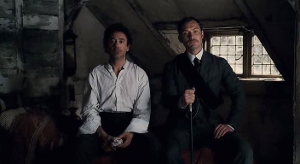 I could care less about Robert Downey Jr.’s personal reformation into an Action Hero and franchise flagbearer. He must be doing something right, though damned if I can find two movie critics who’ll agree on just what that is. Most dismissed his turn as Sherlock Holmes, and dismissed this film as a bit of mindless fluff meant to tide us over until Iron Man 2. Read Rotten Tomatoes and you’ll find this film suffers from the usual consensus: it’s a bit of fun, sure, but in no sense civilized. And it ruined Sherlock Holmes.
I could care less about Robert Downey Jr.’s personal reformation into an Action Hero and franchise flagbearer. He must be doing something right, though damned if I can find two movie critics who’ll agree on just what that is. Most dismissed his turn as Sherlock Holmes, and dismissed this film as a bit of mindless fluff meant to tide us over until Iron Man 2. Read Rotten Tomatoes and you’ll find this film suffers from the usual consensus: it’s a bit of fun, sure, but in no sense civilized. And it ruined Sherlock Holmes.
Both of these readings are false, the product of a false consciousness that lets actors and directors walk away with all the credit or the blame. This ignores the real lesson Arthur Conan Doyle’s stories teach because it has to do with plot…and if that were important we’d all be watching smarter films (instead of, say, Iron Man 2). All of Doyle’s stories are wound Swiss watches of plotting, simultaneously illustrating and espousing upon Sherlock Holmes’ vaunted methods of Reasoning. Tonight, then, let us assay this Sherlock Holmes‘ plot, in the hope of understand why this film managed to disappoint almost everyone who saw it.
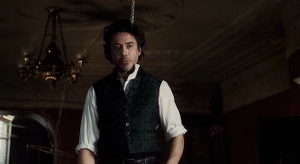 Welcome, then. And you don’t know how lucky you are to be back in the soot-caked arms of Victorian London. From the overcast skies and the Tower Bridge, still well under construction, we can surmise that our story takes place sometime between 1887 and 1894. Our introductory action scene, with its frantic camera work, makes plain what everyone in the audience should already know: this is a Guy Ritchie film, with Robert Downey Jr. as Sherlock Holmes and Jude Law as Dr. James Watson.
Welcome, then. And you don’t know how lucky you are to be back in the soot-caked arms of Victorian London. From the overcast skies and the Tower Bridge, still well under construction, we can surmise that our story takes place sometime between 1887 and 1894. Our introductory action scene, with its frantic camera work, makes plain what everyone in the audience should already know: this is a Guy Ritchie film, with Robert Downey Jr. as Sherlock Holmes and Jude Law as Dr. James Watson.
But save that for the discussion of casting. We catch up with Holmes and Watson as they aid police Inspector Lastrade (Eddie Marsan) in breaking up a cult headed by the nefarious-looking Lord Blackwood (Mark Strong – in the process of playing Sinestro in the live-action Green Lantern film even as we speak). Blackwood’s developed the bad habit of leaving his mutilated human sacrifices all over town, where any Great Detective worth his adjectival modifier can poke about them. So much for Our Villain, who obviously doesn’t know with whom he is fucking.
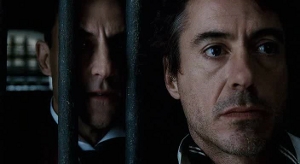 After a bit of forty-eight-frames-per-second fighting, we’re off to the Baker Street. It’s an indeterminate amount of weeks/months/years later, and Holmes is drearily drinking his seven percent solution, putting bullet holes in the wall, and spooking Dr. Watson’s one-and-only patient (the only one we’ll ever see him treat of the course of the film, at any rate). All to relieve the tedium of ordinary, in-between-cases life…and deal with the fact that Watson’s moving out. He’s found a girl named Mary (Kelly Reilly) who’s not at all contrary to fulfilling every Jewish mother’s dream and marrying a doctor. Holmes, unsurprisingly, takes this impending news with all the haughty disdain he can summon. He also reveals himself for the deft manipulator, easily goading Marry into insisting he demonstrate his famous deductive powers on her. In public. And around the dinner table, no less. Mary responds with an appropriate glass-of-wine-to-the-face, answering the secret prayers of a million Ally McBeal detractors (assuming, of course, God didn’t already answer those through the medium of multiple DUI arrests). Nine years late is better than never.
After a bit of forty-eight-frames-per-second fighting, we’re off to the Baker Street. It’s an indeterminate amount of weeks/months/years later, and Holmes is drearily drinking his seven percent solution, putting bullet holes in the wall, and spooking Dr. Watson’s one-and-only patient (the only one we’ll ever see him treat of the course of the film, at any rate). All to relieve the tedium of ordinary, in-between-cases life…and deal with the fact that Watson’s moving out. He’s found a girl named Mary (Kelly Reilly) who’s not at all contrary to fulfilling every Jewish mother’s dream and marrying a doctor. Holmes, unsurprisingly, takes this impending news with all the haughty disdain he can summon. He also reveals himself for the deft manipulator, easily goading Marry into insisting he demonstrate his famous deductive powers on her. In public. And around the dinner table, no less. Mary responds with an appropriate glass-of-wine-to-the-face, answering the secret prayers of a million Ally McBeal detractors (assuming, of course, God didn’t already answer those through the medium of multiple DUI arrests). Nine years late is better than never.
It seems Lord Blackwood’s immanent execution is the only bright spot in Holmes’ life. As a last request, Blackwood calls Holmes down to the jailhouse for a bit of between-the-bars Monologuing. “Your mistake, ” Blackwood warns, “is to imagine that anything earthly has led to this moment…But beneath your mask of logic I sense of a fragility. That worries me…Three more will die, and there is nothing you can do to save them…But by the time you realize you’ve made all this possible, it’ll be the last sane thought in your head.” Ah-ha! A challenge! Exactly what Holmes needs to cease his moping over Watson’s immanent departure.
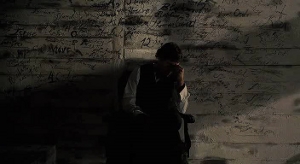 And what to his wondering eyes should appear but The Only Woman, Irene Adler (Rachel McAdams, whom I only know from Mean Girls, despite her turn in 2008’s Time Travelers Wife, the sci-fi story before which everyone was supposed to prostrate themselves), come to deliver the rest of the plot, right on schedule. Seems a mysterious Third Party has contracted her to contract Holmes to find the Secret Thing Lord Blackwood was really working towards down in London’s finer catacombs and back-alley laboratories. Blackwood’s (apparent) resurrection and escape from his own grave only turn the fire under Holmes’ ass up to 19 and we’re off…to see pretty much exactly what we expect.
And what to his wondering eyes should appear but The Only Woman, Irene Adler (Rachel McAdams, whom I only know from Mean Girls, despite her turn in 2008’s Time Travelers Wife, the sci-fi story before which everyone was supposed to prostrate themselves), come to deliver the rest of the plot, right on schedule. Seems a mysterious Third Party has contracted her to contract Holmes to find the Secret Thing Lord Blackwood was really working towards down in London’s finer catacombs and back-alley laboratories. Blackwood’s (apparent) resurrection and escape from his own grave only turn the fire under Holmes’ ass up to 19 and we’re off…to see pretty much exactly what we expect.
And that, finally, is where this, Sherlock Holmes jumps its shark. I have no problem with idea of the Great Detective matching wits with an evil cult leader who plans to take over the world. And I have no problem with Downey playing the titular role. He plays Holmes as only someone who knows what it’s like to be the Perpetual Outsider could. If anyone knows about expending Herculean effort to escape the tedium of everyday life it’s a junky, current or reformed. And while preparing for this flick Downey obviously took an extraordinary step I doubt its producers even considered: he actually read Doyle’s stories. Instead of slavishly aping Basil Rathborne (or whomever – insert your favorite Holmes here), Downey chose to take a harder turn and make the role his own, choosing to accent the eccentric in “eccentric genius.”
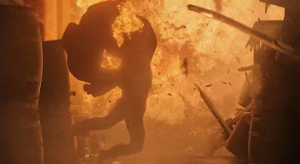 No wonder critics mistook Downey’s take on the character for an actor’s (or director’s – hell, let’s just say “artist’s”) power fantasy: that’s what Sherlock Holmes is. The Talented Individual, alienated from a society that just doesn’t understand him, and so cannot see what a Talented Individual he really is at heart, underneath the obsessive-compulsive workaholism and the reliance on Dangerous Drugs. Let me put it this way: Twilight stole alienated posturing from us. Downey is attempting to steal it back for all of us who are truly alienated. I can applaud him for that…quietly…over here in my little corner. And for carrying this strange little picture, on his back, through heavy fire. Not as heavy as the flack for Iron Man, but still…here, as there, the enthusiasm Downey brings to the role keeps what would otherwise be a formula picture from completely boring me.
No wonder critics mistook Downey’s take on the character for an actor’s (or director’s – hell, let’s just say “artist’s”) power fantasy: that’s what Sherlock Holmes is. The Talented Individual, alienated from a society that just doesn’t understand him, and so cannot see what a Talented Individual he really is at heart, underneath the obsessive-compulsive workaholism and the reliance on Dangerous Drugs. Let me put it this way: Twilight stole alienated posturing from us. Downey is attempting to steal it back for all of us who are truly alienated. I can applaud him for that…quietly…over here in my little corner. And for carrying this strange little picture, on his back, through heavy fire. Not as heavy as the flack for Iron Man, but still…here, as there, the enthusiasm Downey brings to the role keeps what would otherwise be a formula picture from completely boring me.
The rest of the cast suffers from orbiting Downey’s Superholmes. I feel sorry for the cavalier way the script keeps dismissing them and their pointless, ordinary lives. I would’ve appreciated an actual character arc for Watson. Instead, he gets a fiance. Irene Adler gets a boss in the shadow we all know to be Professor Moriarty…so why bother hiding him at all? Mary Mortison gets the most tortured reconciliation scene since General Ross agreed to drop Bruce Banner on Harlem. (Or was it the Bronx? Does anyone care?) Here’s this man, Mr. Sherlock Holmes: he calls you a gold-digger (in so many words) the first time you meet, drags your fiance into one dank back alley fight scene after another, almost gets your fiance killed (thank god that bomb went off in slow motion, eh wot?) and now you’re going to tell him to, “solve this, whatever it takes”? Excuse me? Can we get a second dimension here? I’m not even going to hold out for threesies at this point.
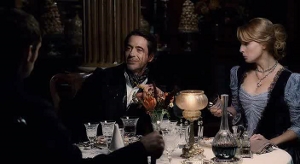 And just what is Holmes solving? Lord Blackwood’s plot to “try to take over the world” is no Great Mystery. Neither is the pseudo-magic Blackwood employs to this end. There’s nothing surprising, fresh, or even vaguely original about Our Villain. At least Arthur Conan Doyle occasionally threw his antagonists a bone in the form of a Tragic Past or a Fatal Flaw or something. Dime novel stuff for the most part, but at least that lent a bit of moral shading to the tales, insulating the audience from Holmes’ massive ego and calculating bastardry. Here, the Great Detective squares off against a half-baked proto-fascist, complete with Gestapo-approved high-collared coat and Hannibal Lecter lights in his eyes. He might as well slip on the skull mask, grab his staff with the pimped-out ram’s horns at the top, and pick up a fetish-gear-bedecked Meg Foster on his way to the destruction of Parliament.
And just what is Holmes solving? Lord Blackwood’s plot to “try to take over the world” is no Great Mystery. Neither is the pseudo-magic Blackwood employs to this end. There’s nothing surprising, fresh, or even vaguely original about Our Villain. At least Arthur Conan Doyle occasionally threw his antagonists a bone in the form of a Tragic Past or a Fatal Flaw or something. Dime novel stuff for the most part, but at least that lent a bit of moral shading to the tales, insulating the audience from Holmes’ massive ego and calculating bastardry. Here, the Great Detective squares off against a half-baked proto-fascist, complete with Gestapo-approved high-collared coat and Hannibal Lecter lights in his eyes. He might as well slip on the skull mask, grab his staff with the pimped-out ram’s horns at the top, and pick up a fetish-gear-bedecked Meg Foster on his way to the destruction of Parliament.
I’ll bet you money the fault lies not with Guy Ritchie. His spider-sense-o-vision will probably annoy those of you who didn’t spend your childhood guzzling high fruitose corn syrup. But it provides a perfect visualization of Holmes’ POV…probably the closest anyone will ever get into the man’s head…unless you Quantum Leap back into Arthur Conan Doyle’s body. (Don’t.) No, I imagine the fault lies right under the Producer credit, with Lionel Wigram (who, because he produced Harry Potters 4 and 5, now seems to think he can come up with stories for movies) and Michael Robert Johnson (who probably did most of the actual writing, such as it is).
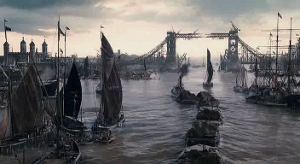 I can just see the production meeting now. Wigram flicks an involuntary hand through the slick, blue dome of his hair and turns to his friend, Michael. “You always wanted to write a big movie, didn’t ya, friend? Well, stick with me. I’ve got the whole thing figured out. After those two Potter flicks I can get away with anything in this town. Bums mine gold from my footprints. I could eat coal and have sixteen WGA-rejects in here prospecting in the toilet for diamonds. And I’ve got the best idea in the world: there hasn’t been a Sherlock Holmes movie for twenty years, and now I’m gonna be in charge. It’ll be more than a movie: it’ll be a damn franchise. Put a pair of hot, young dudes up front, for the laides and gay gents. For the dudes and lezzies, we’ll throw in that chick from Scandal In Bolivia, or whatever, and make her a badass. Get Guy Richie to direct. He’s British. They love his shit overseas. We just need something…”
I can just see the production meeting now. Wigram flicks an involuntary hand through the slick, blue dome of his hair and turns to his friend, Michael. “You always wanted to write a big movie, didn’t ya, friend? Well, stick with me. I’ve got the whole thing figured out. After those two Potter flicks I can get away with anything in this town. Bums mine gold from my footprints. I could eat coal and have sixteen WGA-rejects in here prospecting in the toilet for diamonds. And I’ve got the best idea in the world: there hasn’t been a Sherlock Holmes movie for twenty years, and now I’m gonna be in charge. It’ll be more than a movie: it’ll be a damn franchise. Put a pair of hot, young dudes up front, for the laides and gay gents. For the dudes and lezzies, we’ll throw in that chick from Scandal In Bolivia, or whatever, and make her a badass. Get Guy Richie to direct. He’s British. They love his shit overseas. We just need something…”
“…a plot, sir…?”
“Oh, hell, no. That’s the easiest bit of all. Some evil guy wants to take over the world, Sherlock Holmes has to stop it. Bang. You’re done. Gimmie a draft in two weeks, I’ll let three other writers butcher it, and after I throw a rope around Robert Downey Jr and drag his rehabbed ass back here, we’ll be good to go. Oh, you just can’t use Moriarty.”
“But…b-but…why not, sir?”
“You just can’t. We need him for the sequel. But try not to mention him by name, and I’ll have to lean hard on that Madonna-loving bastard to make sure his face stays hidden. So we can keep the part open. And so nobody distracts from our main villain.”
“You mean…the one you want me to just come up with…out of thin air.”
“Hell no. Pull him out of your ass, man. That’s where all the good writers go when they need fresh ideas.”
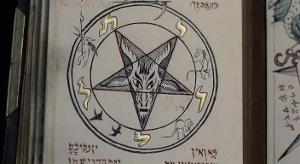 And so we have Sherlock Holmes, an over-long, scatter shot of a film made of equal parts Action and Detective Story cliches. Sure there are fight scenes and slow motion explosions, but every fifteen minutes or so we have to drop everything and allow Holmes (and Ritchie) an expository, show-off speech. You could set your watch by these dandies and despite Ritche’s best efforts, no amount of quick intercutting can make these monologues any easier to swallow than they were over a hundred years ago. Downey and Jude Law seem to be the only people here who actually trusted in the genre to provide inspiration. They endear themselves by actually playing detectives…who just so happen to be trapped in a Hollywood action film.
And so we have Sherlock Holmes, an over-long, scatter shot of a film made of equal parts Action and Detective Story cliches. Sure there are fight scenes and slow motion explosions, but every fifteen minutes or so we have to drop everything and allow Holmes (and Ritchie) an expository, show-off speech. You could set your watch by these dandies and despite Ritche’s best efforts, no amount of quick intercutting can make these monologues any easier to swallow than they were over a hundred years ago. Downey and Jude Law seem to be the only people here who actually trusted in the genre to provide inspiration. They endear themselves by actually playing detectives…who just so happen to be trapped in a Hollywood action film.
Is detective fiction dead? Far from it. But that Enlightenment Ubergenre, the Victorian Great Detective Story, is certainly on life support. Movie makers evidently feel the need to inject it with either (a) realist melodrama (see Zero Effect) or (b) set-piece-specific fisticuffs. These flagrant attempts to transplant the Detective only reduce his Stories to the same inanimate mush we’ve been seeing for years. That is the real reason to despise this film, Sherlock Holmes‘ only true, unforgivable sin.
![]()
![]()
![]()

Great review. I didn’t see Sherlock Holmes, mostly because I figured it would be just as you’ve pegged it. On the other hand, I do think Robert Downey Jr is doing some excellent work lately. (No idea about Iron Man 2, I haven’t seen it and probably won’t til it makes its way to video.)
You could always do what I did and read the novelization by Alex Irvine, an assistant professor of English at the University of Maine. (And how cool is that? Jerry Rubin was right: We nerds really are everywhere.) Irvine wrote an Ultimates novel back in 07 and so brings an experienced hand to the Robert Downey-Stark and his continuity. The result is as close to believable as a novelized Hollywood superhero story is ever likely to get. Like Peter David’s write-ups of the Spider-man Trilogy.